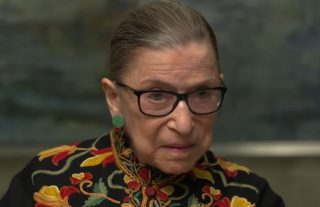 There were many losers in the 2016 elections besides Hillary Clinton. National Democrats, President Obama, Jeb Bush, environmentalists, and free trade neoliberalism are but a few. In the constellation of figures and institutions whose work the 45th president is now set to upend, none may be as consequential as the Supreme Court and the work of a quiet Jewish judge from Brooklyn, Ruth Bader Ginsburg.
There were many losers in the 2016 elections besides Hillary Clinton. National Democrats, President Obama, Jeb Bush, environmentalists, and free trade neoliberalism are but a few. In the constellation of figures and institutions whose work the 45th president is now set to upend, none may be as consequential as the Supreme Court and the work of a quiet Jewish judge from Brooklyn, Ruth Bader Ginsburg.
Nobody can deny that since her appointment in 1993, Ginsburg has been a lion. As a stalwart of the court’s liberal wing, she has authored major opinions ranging from gender equality, to insider trading to mental illness. Throughout her tenure, Ginsburg’s legal and intellectual powers have remained as sharp as Japanese steel.
Nevertheless, the Justice — now in her ninth decade — took an enormous risk by staying on the court past the presidency of Barack Obama. Regardless of party, there can be no debate that her decision to remain into the tenure of Donald Trump has put her life’s work and all of the causes she cares about at risk.
With the nomination of Judge Neil Gorsuch to replace Antonin Scalia, Donald Trump, made good on a promise to the traditional conservatives who reluctantly backed his candidacy. After a requisite period of huffing and puffing from Senate Democrats, it is almost certain that Gorsuch will take his place on the high court. While it will no doubt be a bitter pill for progressives, the appointment will not change the fundamental ideological balance on the bench.
That wouldn’t be the case with Ginsburg. If replaced by a Gorsuch-style jurist, the Supreme Court would lurch distinctly rightward. You don’t have to be an actuary to see why the prospect has raised conservative hopes and jangled liberal nerves. Justice Ginsburg battled colon cancer in 1999 and pancreatic cancer a decade later. In 2014 she received a coronary stent after another health scare. During a recent appearance at the Kennedy Center in Washington, the Associated Press described her as “frail.”
In 2016, Slate calculated that the likelihood of Justice Ginsburg dying by 2021 was more than 35%. The predicament is likely all the more maddeningly for liberals as calls for Ginsburg’s retirement reached a fever pitch in the years immediately following President Obama’s re-election in 2012. In her public comments, however, the Justice steadfastly foreclosed the possibility. “There will be a president after this one, and I’m hopeful that that president will be a fine president,” she told the New York Times’ Adam Liptak.
Wielding the cudgel of identity liberalism, a number of Ginsburg’s defenders immediately leapt to genderize the issue and accuse those calling for her retirement of “sexisim.” Writing for Slate in 2013, Emily Bazelon blithely dismissed Ginsburg’s long history of health troubles and attributed calls for her retirement to the fact that she was a “small, slender woman who speaks in low tones and looks like a bird.” A piece by Garrett Epps for The Atlantic titled, “Don’t Tell Ruth Ginsburg to Retire,” begins with a reminder that “If Justice Ruth Bader Ginsburg had followed advice from male law professors like me, she would probably not be where she is today.”
As is their wont, these, and similar takes, allowed the left’s peculiar fetish for victimhood, to obscure what should have been obvious.
Some more serious observers might argue that a Ginsburg retirement may have simply precipitated the sustained Republican obstruction that came in the wake of the sudden death of her friend and colleague Antonin Scalia, but this doesn’t wash either. The Democrats controlled the Senate up until the 2014 elections in November. Assuming he could keep his own party in line, President Obama could have swiftly confirmed almost anyone he wanted. If Republicans filibustered, Senate Democrats could have eliminated it.
In a remarkably prescient Op-Ed for the Los Angeles Times in March, 2014, Erwin Chemerinsky, dean of the UC Irvine School of Law, warned that Ginsburg needed to retire in 2014 to avoid exactly the same issue that confronted President Obama and Merrick Garland in 2016.
“If Ginsburg waits until 2016 to announce her retirement, there is a real chance that Republicans would delay the confirmation process to block an outgoing president from being able to fill a vacancy on the Supreme Court. In fact, the process for confirming nominees for judicial vacancies usually largely shuts down the summer before a presidential election.”
Indeed, should President Trump wind up appointing a successor to Justice Ginsburg, she may find herself in an unusual spot — a hero to judicial conservatives, who will laud her for holding on just long enough to give them an opening.
This is an opinion piece. The views expressed in this article are those of just the author.